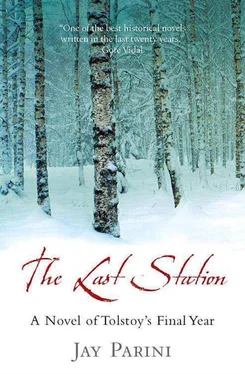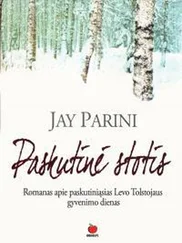Mama accepted her welcome in garbled French, which, to my ear, sounded more like Chinese. ‘ Merci beaucoup! C’est une belle maison! Une belle maison! Mais oui! ’ she cried.
Lyovochka, looking red-faced and out of breath, came hurling through the door apologetic, saying that he hadn’t quite expected us. But he didn’t make us feel guilty. Like a French courtier, he kissed everyone’s hand in turn, lingering that extra moment over mine. I lit up inside, ablaze with love. I did not know where to look or what to say.
‘Let me show you the orchard,’ he said. It seemed odd, especially to Mama, that he wanted us to see the orchard before we toured the house itself, but Mama was not going to object.
‘We just adore orchards,’ she said. ‘Don’t we adore orchards, girls?’
‘I haven’t thought much about it,’ Lisa said. She could be so tedious.
We paused by a thicket of bushes strung with ripe, red fruit. ‘Raspberries!’ Tanya screamed, as if she’d never seen them before.
Lyovochka handed around pails, and we were all told to begin picking, right then and there – even Mama, who made the best of what she considered an unfortunate situation. ‘What charming raspberries,’ she said. ‘Don’t we just adore raspberries?’
I stepped off with a pail behind one of the big bushes and had been happily, mindlessly, picking berries for a few minutes when Lyovochka sprang, like a bear, from behind a swatch of leaves.
‘You frighten me!’ I said.
He took my pail away and held my hands. ‘I’m sorry,’ he said. ‘I am.’
‘You should be.’
He did not let go of my hands. ‘These are city hands,’ he said.
He held them and looked at me for such a long time. I said, ‘Would you like a berry?’
Like a defiant child, he plucked a berry from my pail and popped it between his coarse lips. I spotted his fat red tongue and looked away.
‘I must go,’ he said. And disappeared.
Now I knew that my instincts were correct. It’s strange how one can know everything at once about the future – not the details, but the overall picture. I knew that my life would be spent here, on these grounds, with Leo Tolstoy. I also knew that I would be his harshest critic and his best friend. And that heartache lay ahead of me, unspecified but cruel.
I carried this secret, miraculous knowledge with me, hoarded it like an amulet. It would ruin everything if they found out before the time was ripe.
Tanya, Lisa, and I lodged together in the vaulted room on the ground floor that nowadays is crammed with stinking, uncouth disciples: insane noblemen, beggars who are proud of their fallen state, toothless nuns, idealistic students, revolutionaries, criminals, vegetarians, foreigners. The mad economist Nikolayev is here, preaching Henry George’s theory of the single tax. He slurps his soup on the linen tablecloth, splashing those to his right and left. Drankov, the cinematographer, is here, too. I don’t mind him, although he is constantly taking our picture.
I thought Lyovochka would propose to me after dinner, but he didn’t. By the time we left, two days later, nothing had happened. Worse, he acted as though we had never exchanged a moment of intimacy. I began to doubt my perspicacity. Perhaps I had been mistaken all along? Perhaps he had behaved the same with Lisa? Even with Tanya? As we departed, I could barely fend off despair, though I maintained a cheerful countenance. I comforted myself with the fact that Lisa was more miserable than I. She wept openly as we clattered off behind a troika, and Mama scolded her. ‘He will ask you in his own good time,’ she said, disappointment curdling her voice.
Two days later, at Grandfather’s house, Tanya wakened me. ‘It’s the count!’
‘You’re teasing me.’
‘No, it’s true! He’s come on a white horse.’
Leave it to my Lyovochka. Grandstanding, as usual. ‘A horse,’ he once said, ‘is the symbol of the rider’s soul.’
Grandfather welcomed him eagerly, grinning and bowing. He was so queer, with his close-shaven skull and black skullcap, a razorlike nose. His hairy fingers, like the legs of a tarantula, seemed always to be moving. His eyes were independent of each other, like fish eyes, poking out from opposite sides of his narrow head.
Lyovochka was covered with white dust and sweat. He affected a shy, boyish grin, apologizing for his condition.
Grandfather told him not to think twice about it. It was an honor, he said. ‘And how long did it take you, Leo Nikolayevich? It’s such a long way to come on horseback.’
‘Three hours. Perhaps a bit more. I was in no hurry. It’s a lovely day, isn’t it?’
‘Let me get you a drink?’
‘That would be very kind of you, sir.’
We huddled in the shade of the hall, listening to their exchange. I wore a muslin dress that day, a white one for summer, with a lilac-tinted rosette on the right shoulder. I trailed a long ribbon down one arm, the kind we used to call Suivez-moi, jeune bomme .
‘He has come for you, Lisa,’ my mother said. She could barely restrain her giddiness and pride. ‘Today is your day.’
‘I wouldn’t sleep with a dusty man like that,’ said Tanya to Lisa.
Lisa turned her nose up. To give in to her sister’s taunts would be unbecoming of a future countess.
The day followed a summery course of gay (though hardly extraordinary) meals, with lots of party games and silly jokes. The strain of waiting for the count to strike seemed unbearable to poor Grandfather. Mama was hardly any better. Her conversation lapsed into inanities that, fortunately, the count never noticed.
It happened after dinner. Everyone had left the dining room but myself and the rather obviously hyperventilating count. He turned to me and said, ‘Could you wait a moment, Sofya Andreyevna? It’s so pleasant in here.’
‘It’s a charming room, isn’t it?’ I said, lying through my teeth.
‘The food is excellent here.’
‘Grandfather likes his food.’
We shifted from foot to foot. Get on with it, I thought.
‘Come sit beside me on the sofa,’ he said. ‘You wouldn’t mind that, would you?’
I smiled and followed him to the little sofa along the side wall. He sat down first, impolitely, but his doing so allowed me to choose my position. For the sake of modesty, I left a few inches between us.
He pulled a green, baize-covered table up to our knees and took a piece of chalk from his coat pocket. I watched him closely as he leaned over the table and began to scribble on its soft cover.
He wrote: ‘Y.y.a.y.d.f.h.r.m.c.o.m.a.a.t.i.o.h.f.m.’
I stared at the peculiar inscription.
‘Can you decipher this?’
‘It’s a string of letters, Leo Nikolayevich.’
Was this some sort of after-dinner game played by the aristocracy? My stomach tightened.
‘I can help you,’ he said. ‘The first two y’s represent the words Your youth .’
‘Your youth and your desire for happiness remind me cruelly of my age and the impossibility of happiness for me,’ I cried, having reconstructed the entire sentence. It was a miracle!
When the meaning wakened in my head, I shuddered. Everything fell clear.
Lyovochka, meanwhile, was rubbing out what he had written and starting the little game all over again.
This time, he wrote: ‘Y.f.i.w.a.m.f.t.L.H.m.t.c.t.’
I knew exactly what he meant once I understood that L was for Lisa. ‘Your family is wrong about my feelings toward Lisa. Help me to clarify this.’
An actual proposal did not follow for several weeks, but I knew now that poor Lisa was finished. He loved me alone.
When Lyovochka visited us in Moscow in September, I gave him a story I had written. It was about a tender young girl who had a suitor called Dublitsky – an old, rather ugly nobleman. He wished, more than anything in the world, to marry her, but she wasn’t sure if she really wanted him. I don’t know why I wrote such a story. I didn’t actually think of Lyovochka as old and ugly, though he was a little of both. I gave it to him without realizing it might cause pain. His response came, by post, a few days later:
Читать дальше












